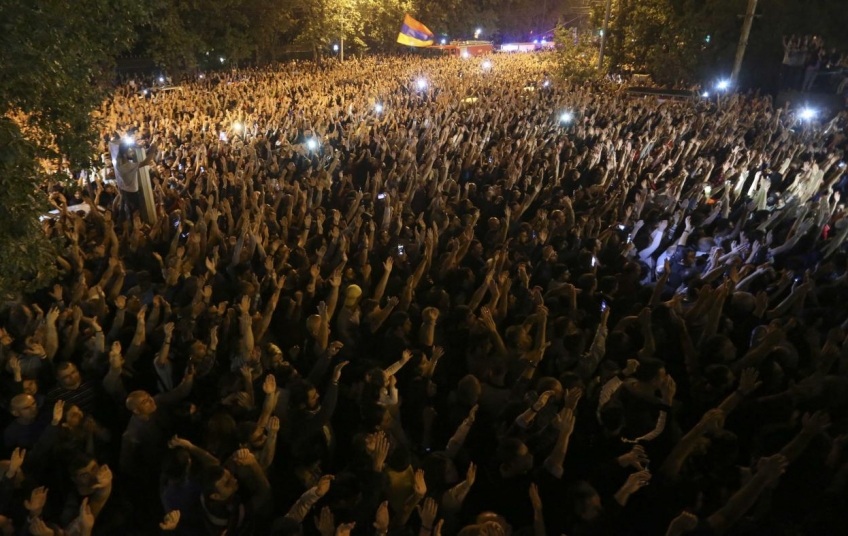September 22-29
Trump urges world to reject globalism in UN speech
As The Guardian writes, during his speech at the United Nations 73rd General Assembly, the U.S. President Donald Trump proclaimed that “America is governed by Americans,” and “we reject the ideology of globalism and we embrace the doctrine of patriotism.” He urged states to focus on their own national interests. He said: “Around the world, responsible nations must defend against threats to sovereignty not just from global governance, but also from other, new forms of coercion and domination.”
In his speech Trump highlighted the achievements of his presidency, lashed out at enemies –Iran foremost among them. “Iran’s leaders sow chaos, death and destruction. They do not respect their neighbors or borders or the sovereign rights of nations,”-said Trump. He also accused Iranian leaders of embezzling “billions of dollars” and lining their own pockets. Talking about the crisis in Syria, he once again mentioned Iran: “Every solution to the humanitarian crisis in Syria must also include a strategy to address the brutal regime that has fueled and financed it: the corrupt dictatorship in Iran.”
As The New York Times informs, during a meeting at the U.N. Security Council, he also focused his attention on sanctions against Iran. Trump said he planned to introduce new economic sanctions on Iran later this year, adding that they would be “tougher than ever before.”
President Hassan Rouhani of Iran retaliated that the United States had isolated itself at the world organization by renouncing the Iran nuclear agreement and by warning others they should heed restored American sanctions or face reprisals.
Meanwhile, the Trump administration issued a stark warning to the United States’ closest European allies on Tuesday, promising to sharply penalize European governments or companies that continue to do business with Iran.
“We do not intend to allow our sanctions to be evaded by Europe or anybody else,” John R. Bolton, the national security adviser, said in a speech at a “United Against Nuclear Iran” group’s summit on Tuesday and promised “terrible consequences” for anyone who continues to do business with Iran after Nov. 4, the day the United States will reinstate the remaining sanctions it had lifted under the deal.
According to the same report, Secretary of State Mike Pompeo said at the same forum that the Trump administration was “disturbed and deeply disappointed” by plans announced Monday night by Britain, France, Germany and other countries committed to the Iran nuclear accord to create an unspecified economic channel that would be protected from American sanctions.
“This is one of the most counterproductive measures imaginable for regional and global peace and security,” Mr. Pompeo said. “By sustaining revenues to the regime, you are solidifying Iran’s ranking as the No. 1 state sponsor of terror.”
September 29 - October 6
Mass rally in Yerevan
Reuters writes that thousands gathered outside the parliament building in the Armenian capital Yerevan on Tuesday to demand early parliamentary elections, led by Prime Minister Nikol Pashinyan.
The inform agency reports that “the latest protest was triggered by parliament’s sudden decision on Tuesday to approve changes to parliamentary regulations which may delay such elections. The changes were supported by Republicans and also two factions, Prosperous Armenia and Dashnaktsutyun, which had supported Pashinyan during the unrest earlier this year.”
Speaking to the rally, Pashinyan informed that hе has sacked six ministers in his government from Prosperous Armenia and Dashnaktsutyun.
The New York Times also informing about the rally, writes that “Pashinyan called on his supporters to protest the move and several thousand quickly gathered outside parliament. Pro-Pashinian lawmakers blocked the exits to prevent his opponents from leaving the building.”
Radio Free Europe/Radio Liberty cites Pashinyan’s fiery speech: "They have waged a war against their people.” Pashinyan also called on his supporters to remain peaceful and not to prevent lawmakers from leaving the parliament compound.
The prime minister said he wanted elections to be held in the first half of December, adding that the composition of parliament did not reflect the country's political reality.
“Holding early parliamentary elections was one of the conditions of our velvet revolution and was included in the government program, which was approved by the parliament,” Pashinyan told the protesters.
Pashinian also told his supporters he would urge President Armen Sarkissian not to sign the bill into law.
Prepared by Marina Muradyan





